Ultra-Low Latency Certification: Performance Testing of DapuStor R5100 NVMe SSD on Aerospike
► In the supermarket, it takes two minutes before the facial recognition payment is completed.
► When opening a webpage on the computer, you must wait for half a minute until the page starts loading gradually.
► After booting up, you type on the keyboard multiple times, but the input method still fails to appear.
These are bad experiences caused by high data read and write latency that individual users may feel.
Enterprises have even stricter requirements for read and write latency. Numerous business scenarios demand ultra-low latency data processing, such as real-time bidding advertising systems, fraud detection, real-time payment processing, and product recommendation engines. In these scenarios, a storage system of high performance and low latency can improve the responsiveness and throughput of applications, thus enhancing user experience and business efficiency. We need tools to certify the performance differences among data storage products, thereby helping enterprise customers select storage products that best suit their application scenarios.
Aerospike, one of the fastest NoSQL databases, is a distributed and scalable open-source solution. Specifically optimized for flash storage, it supports both RAM and SSD from its initial design, eliminating the need for data exchange between RAM and SSD. Aerospike excels in scenarios that require ultra-low latency and can be used in various network applications such as real-time bidding advertising systems, fraud detection, real-time payment processing, inventory management, and product recommendation engines.
The DapuStor R5100 NVMe SSD was developed based on the company’s in-house controller DP600 and firmware, equipped with KIOXIA’s 112-layer 3D Enterprise TLC, providing customers with industry-leading SSD of exceptional performance, high reliability, and low latency. This product has been in mass production for two years and has been successfully deployed in core storage scenarios of various industries, such as enterprise IT, telecommunications, internet, finance, intelligent manufacturing, AI, and big data analytics.
We have conducted a YCSB Benchmark testing, through the Aerospike database, on the DapuStor R5100 NVMe SSD and three other well-known NVMe SSDs in the industry. The purpose is to see whether different SSDs exhibit consistent performance on the same platform with the same configuration. The details of the testing will be presented in this article, and we hope the testing results will provide a valuable reference for you.
01 Testing
Our testing environment was as follows:
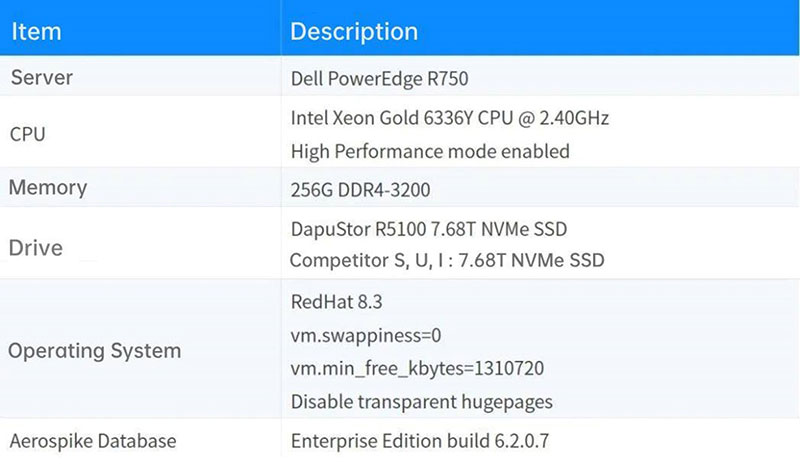
About the Drives
Create 16 namespaces of 450 GB on SSDs from different manufacturers. Before each test, the corresponding drive will be thoroughly erased to ensure consistent testing conditions for each drive.
About YCSB
YCSB (Yahoo! Cloud Service Benchmark) is a tool developed by Yahoo for the basic testing of cloud services. It provides various workloads, and we primarily conducted the testing using Workloads A, B, C, and F. In Workload A, the read and write operations are evenly distributed. Workload B consists of 95% read and 5% write. Workload C is exclusively composed of read operations while Workload F consists of 50% read and 50% read-modify-write. Meanwhile, we modified the default field size from 1000 bytes to 4096 bytes.
Additionally, the client's concurrency testing thread was set to 4, 8, 16, and so on, until the performance of SSDs no longer improved with the increase in threads.
02 Testing Data
Workload A — 50% Read + 50% Write
Workload A is a read-write balanced workload, with the read-and-write operations each accounting for 50%. Application example: Session store recording recent action.
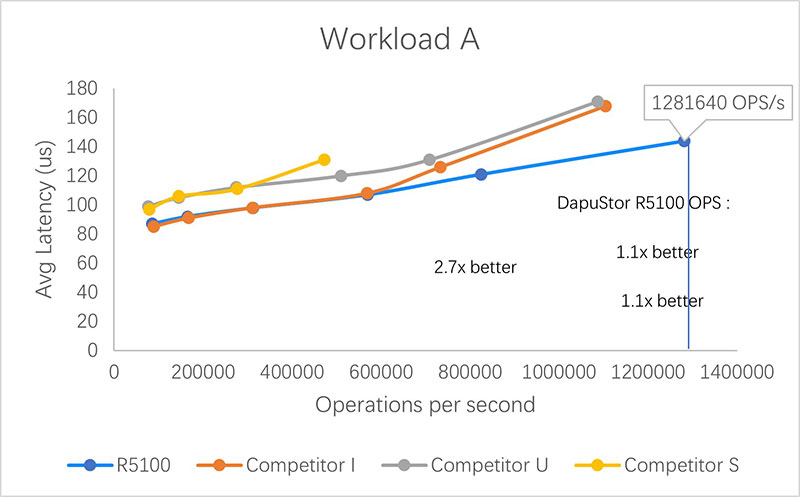
From the above graph, it can be observed that the DapuStor R5100 SSD exhibits significant performance advantages. Compared to competitors, its performance curve is flatter, indicating that it maintains lower latency even under increased pressure, resulting in relatively stable performance. Additionally, the R5100 shows a minimum improvement of 1.16 times in peak OPS compared to competitor drives.
Workload B — 95% Read + 5% Write
Workload B is a read-intensive workload, with read-and-write operations accounting for 95% and 5% respectively. Application example: photo tagging; adding a tag is an update, but most operations are to read tags.
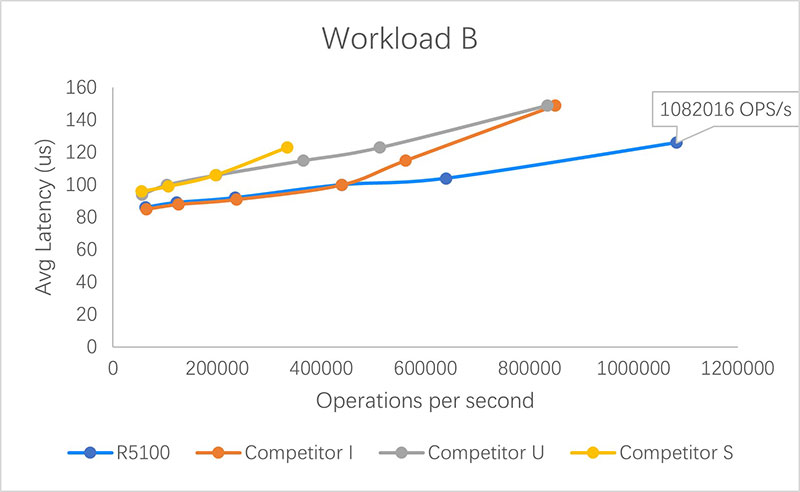
With Workload B, the performance advantage of the DapuStor R5100 SSD remains evident. The peak OPS of Competitor I and Competitor U is around 840,000, while that of the R5100 exceeds 1 million, which is 1.29 times higher than the former two drives.
Workload C — 100% Read
Workload C is a pure read workload. Application example: user profile cache, where profiles are constructed elsewhere.
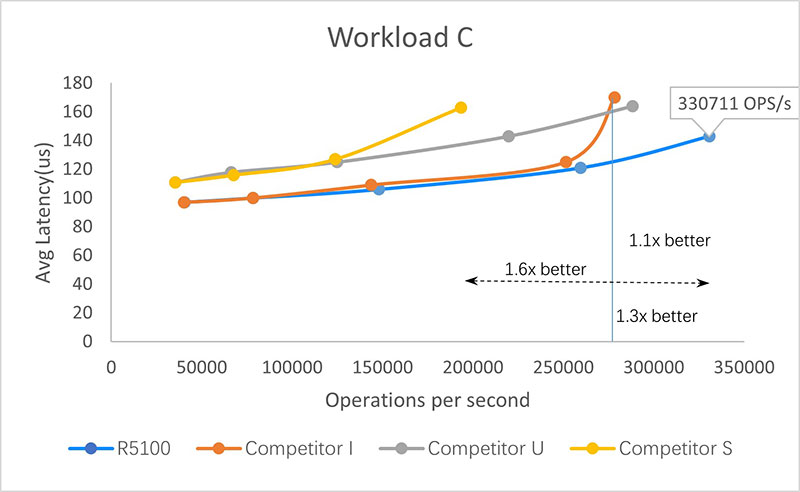
The above graph shows that the overall performance of the DapuStor R5100 SSD surpasses that of the three competitor drives. Compared to its competitors, the peak OPS of the R5100 exhibits a maximum improvement of 1.69 times.
Workload F — 50% Read + 50% Read-Modify-Write
Workload F is a read-modify-write workload, with read and read-modify-write operations each accounting for 50%. Application example: user database, where user records are read and modified by the user or to record user activity.
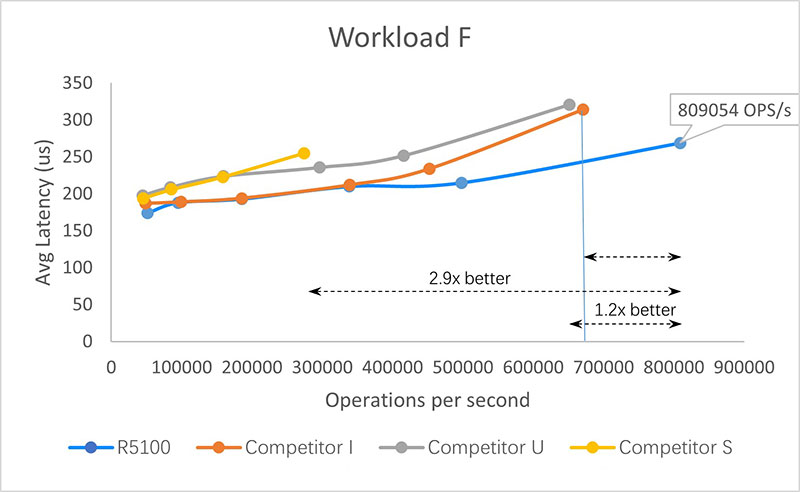
From the graph, it can be observed that the overall performance of the DapuStor R5100 SSD surpasses that of the three competitor drives. The peak OPS of Competitor U and Competitor I is around 670,000, while the R5100 achieves a peak OPS of about 800,000, which is 1.2 times higher than the former two drives.
03 Summary
The DapuStor R5100 SSD demonstrates better performance in all the aforementioned workloads. Compared to Competitor U and Competitor I, it achieves a performance improvement of 16%~34%; while compared to Competitor S, its performance increases by more than 2 times in most workloads. The superior performance of the R5100 has been verified in practical applications. At the 2022 Double Eleven Festival (China’s biggest shopping festival),it successfully enabled the data center of one of the largest domestic e-commerce platforms to pass the test of providing large-scale, ultra-low latency data services.
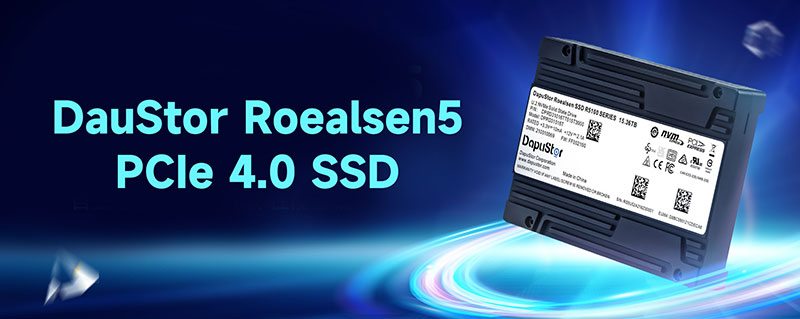
The DapuStor NVMe SSD and Aerospike can provide customers with an application solution with high throughput and low latency. With years of technological accumulation, DapuStor has reached a level comparable to leading global manufacturers in the field of SSD storage technology. Its products exhibit high performance, exceptional stability, and remarkable reliability, enabling enterprises to tackle the numerous data storage challenges posed by digital transformation and empowering innovative business evolution for the future.
